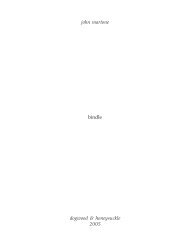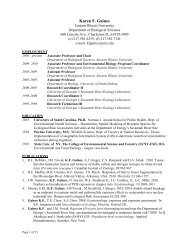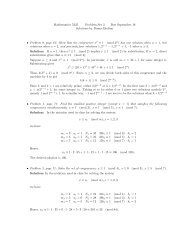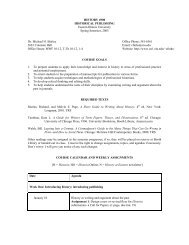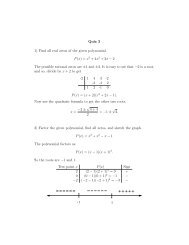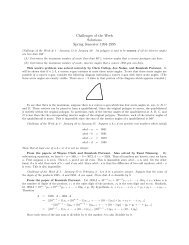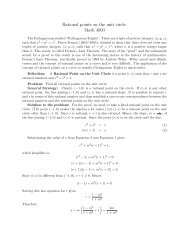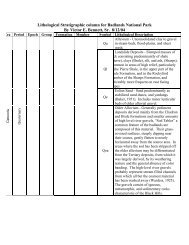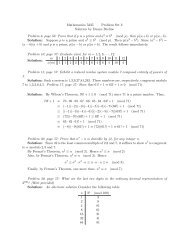Handed My Own Life Annie Dillard - Eastern Illinois University
Handed My Own Life Annie Dillard - Eastern Illinois University
Handed My Own Life Annie Dillard - Eastern Illinois University
Create successful ePaper yourself
Turn your PDF publications into a flip-book with our unique Google optimized e-Paper software.
15Patrick O'Malley wrote the following proposal while he was a first-year college student. He proposes thatcollege professors give students frequent brief examinations in addition to the usual midterm and finalexams. After discussing with his instructor his unusual rhetorical situation-a student advising professors-hedecided to revise the essay into the form of an open letter to professors at his college, a letter that mightappear in the campus newspaper. O'Malley's essay may strike you as unusually authoritative. This air ofauthority is due in /age part to what O'Malley learned about the possibilities and problems of frequent examsas he interviewed two professors (his writing instructor and the writing program director) and talked withseveral students. As you read his essay, notice particularly how he anticipates professors' likely objections tohis proposal and evaluates their preferred solutions to the problem he identifies.More Testing, More LearningPatrick O’MalleyIt's late at night. The final's tomorrow. You got a C on the midterm, so this one will make or break you. Will itbe like the midterm? Did you study enough? Did you study the right things? It's too late to drop the course.So what happens if you fail? No time to worry about that now you've got a ton of notes to go over.Although this last-minute anxiety about midterm and final exams is only too familiar to most college students,many professors may not realize how such major, infrequent, high-stakes exams work against the bestinterests of students both psychologically and intellectually. They cause unnecessary amounts of stress,placing too much importance on one or two days in the students' entire term, judging ability on a single ordual performance. They don't encourage frequent study, and they fail to inspire students' best performance.If professors gave additional brief exams at frequent intervals, students would be spurred to study moreregularly, learn more, worry less, and perform better on midterms, finals, and other papers and projects.Ideally, a professor would give an in-class test or quiz after each unit, chapter, or focus of study,depending on the type of class and course material. A physics class might require a test on concepts afterevery chapter covered, while a history class could necessitate quizzes covering certain time periods or majorevents. These exams should be given weekly, or at least twice monthly. Whenever possible, they shouldconsist of two or three essay questions rather than many multiple-choice or short-answer questions. Topreserve class time for lecture and discussion, exams should take no more than 15 or 20 minutes.The main reason professors should give frequent exams is that when they do, and when theyprovide feedback to students on how well they are doing, students learn more in the course and performbetter on major exams, projects, and papers. It makes sense that in a challenging course containing a greatdeal of material, students will learn more of it and put it to better use if they have to apply or "practice" itfrequently on exams, which also helps them find out how much they are learning and what they need to goover again. A recent Harvard study notes students' "strong preference for frequent evaluation in a course."Harvard students feel they learn least in courses that have "only a midterm and a final exam, with no otherpersonal evaluation." They believe they learn most in courses with "many opportunities to see how they aredoing" (Light, 1990, p. 32). In a review of a number of studies of student learning, Frederiksen (1984) reportsthat students who take weekly quizzes achieve higher scores on final exams than students who take only amidterm exam and that testing increases retention of material tested.Another, closely related argument in favor of multiple exams is that they encourage students toimprove their study habits. Greater frequency in test taking means greater frequency in studying for tests.Students prone to cramming will be required-or at least strongly motivated-to open their textbooks andnotebooks more often, making them less likely to resort to long, kamikaze nights of studying for majorexams. Since there is so much to be learned in the typical course, it makes sense that frequent, careful studyand review are highly beneficial. But students need motivation to study regularly, and nothing works like anexam. If students had frequent exams in all their courses, they would have to schedule study time each weekand gradually would develop a habit of frequent study. It might be argued that students are adults who haveto learn how to manage their own lives, but learning history or physics is more complicated than learning todrive a car or balance a checkbook. Students need coaching and practice in learning. The right way to learnnew material needs to become a habit, and I believe that frequent exams are key to developing good habitsof study and learning. The Harvard study concludes that "lying regular evaluation to good courseorganization enables students to plan their work more than a few days in advance. If quizzes and homeworkare scheduled on specific days, students plan their work to capitalize on them (Light, 1990, p. 33).



